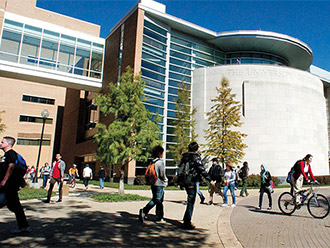Doctors treating patients with anemia may soon gain a valuable tool. Bioengineering Associate Professor George Alexandrakis is collaborating with Southern Methodist University’s MinJun Kim to use nanotechnology to detect defective iron-carrying proteins in blood.
This work has ramifications on so much of our medical lives. I’m sure it will provide a baseline for protein analysis in the future.
“One key in this research is that a very small amount of blood is needed,” Dr. Alexandrakis says. “The protein carries iron, and it can be trapped by our nanosensor. It’s then stretched or heated at the single molecule level so we can probe how it refolds again once left alone. The way it refolds or misfolds gives us a way to see if it is defective or not.”
The nanosensor also has the potential to find proteins defective due to cancer or other illnesses. Alexandrakis, Dr. Kim, and Associate Vice President for Research Jon Weidanz recently received an additional grant to apply the technology to the personalization of cancer immunotherapy.
“This work has ramifications on so much of our medical lives,” says Bioengineering Department Chair Michael Cho. “I’m sure it will provide a baseline for protein analysis in the future.”



